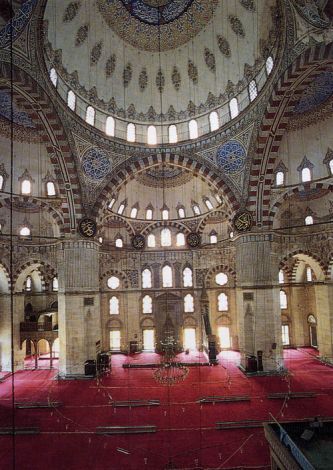NURULLAH ATAÇ (1898 - 1957)
Nurullah Ataç, born on August 21, 1898 in Istanbul , wrote under various pseudonyms such as Sabiha Yagizlar, Ali Gümrükçü, and Süha Kavaoglu. Ataç was twenty one years old and studying in Switzerland when he lost his father and was forced to interrupt his education and to return to Turkey . He became a French language teacher and worked in many of the prominent high schools and universities of the period. Self-taught in French, he was so successful as a French teacher, that he became the official translator of the Republic of Turkey from 1951 until his death in 1957.
Ataç's interest in literature begun with his involvement in the literary journal Dergâh, published by Yahya Kemal, the major literary figure of the period. Ataç, coming to the self-reached conclusion that he would not become a leading literary figure, began to focus on writing essays and criticism.
Ataç's attempts to write poetry and dramatic plays failed, and he never achieved his ambitions in writing. As he was obsessed with creativity, he would have preferred to be known an essayist, yet it was his critical pieces that made him famous. Interestingly, Ataç's critical pieces were not the least bit partial, and they did not intend to improve the dynamics of Turkish literature. In his critical writing, Ataç used a highly subjective, one-sided viewpoint, and he interpreted the works solely through his personal taste. In addition, his writing was full of anger and he tended to ridicule the works and authors. Nonetheless, he still had a tremendous impact on the development of Turkish literature, and attracted attention to critical writing and to the art of criticism itself. In fact, Ataç's irritable attitude resulted in the birth of literary criticism in Turkish literature. Authors of the period were quite apprehensive about what Ataç would write concerning their works. Though he was not necessarily an encouraging critic, Ataç was single-handedly responsible for initiating the art of criticism in Turkish literature. This is probably why encyclopedias tend to refer to him as a man of letters.
Ataç has published in most of the significant national newspapers and journals of the Republican period, and his overall opinion was that Turkish literature needed to become more western, that it should quit tightly adhering to the values of the past. Ataç claimed that literature should be on the side of reason, he frequently criticized flowery and exaggerated works, and he advocated simplicity and clarity. Ataç stressed that language used in literary works should be the same as spoken Turkish, and that this would bridge the communication breakdown that existed among the various classes of society. Ataç stressed that literature needed to renew itself, that worn-out tendencies had to be abandoned, and his approach proved indeed guiding for many literary figures. Ataç composed lengthy and detailed analyses about the literary works that he enjoyed; yet when he encountered one that he did not please him, he did not even bother mentioning it.
Essays were considered a difficult genre for Turkish Literature and Ataç is the first writer to produce essays in the true sense of the word. During his prolific 36 years as a writer, Ataç wrote more than 4,000 essays and critical pieces. In 1935, Ataç was part of a commission established to prepare the dictionary entitled Fransizca - Türkçe Resimli Büyük Dil Kilavuzu (The Great Illustrated French - Turkish Dictionary ). Ataç also has translated more than fifty works until his death in Ankara on May 17, 1957.
Ataç's complete critical works and essays where compiled under the following titles:
Günlerin Getirdigi (What Days Bring, 1946), Sözden Söze (From Words to Words 1952), Karalama Defteri (Sketch Book 1952), Ararken (While Looking 1954), Diyelim (Let's Say 1954), Söz Arasinda (1957), Okuruma Mektuplar (Letters to my Readers 1958), Günce (Diary 1960), Günce II (Diary II 1957), Prospero ile Caliban (Prospero and Caliban 1961), Söylesiler (Conversations 1964), and Dergilerde (In Journals 1980).
* Biographical information concerning Nurullah Atac has been gathered from Tanzimat'tan Bugüne Edebiyatçilar Ansiklopedisi.
Sources: Akyüz, Kenan. Modern Türk Edebiyatinin Ana ÿizgileri , Inkilâp Yayinevi, 1995.
Photograph courtesy of Ara Guler
Reference: Yesim Gokce (Bilkent University)/Turkish Cultural Foundation.
Some selected examples (please click on pictures to enlarge):








